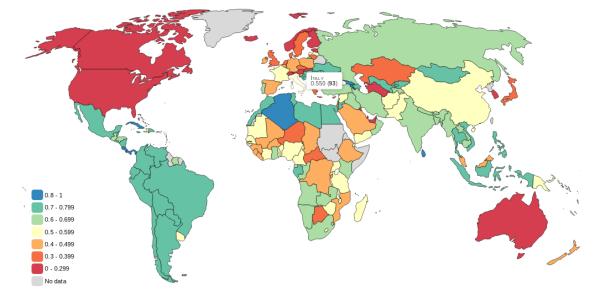Time to measure something else in the world
“If they can get you asking the wrong questions, answers don’t matter.”

So said Thomas Pynchon, and that observation becomes more valid every every year.
The Human Development Index (HDI) of the United Nations is (EEconomic Times) “is a statistical tool used to measure a country’s overall achievement in its social and economic dimensions. The social and economic dimensions of a country are based on the health of people, their level of education attainment and their standard of living.”
The problem with HDI is that all of the top performers are major contributors to several forms of ecological breakdown, which disproportionately affects the poorer countries of the global South. Achieving high development according to HDI means driving de-development elsewhere in the world.
In order to overcome this fundamental contradiction, a new Sustainable Development Index (SDI) has just been launched “to update HDI for the ecological realities of the Anthropocene”. Unlike HDI, SDI recognizes that human development must be achieved while remaining within planetary boundaries.
How does SDI work?
The full method and rationale for the SDI has been published here
SDI starts with each nation’s human development score (life expectancy, health and education) and divides it by their ecological overshoot (the extent to which consumption-based CO2 emissions and material footprint exceed the planetary boundaries for these indicators in per capita terms).
Countries that have high human development while remaining within or near planetary boundaries rise to the top, while countries with low human development, and countries with high levels of overshoot, fall to the bottom.
That is why the best five countries, HDI-wise, are: Cuba, Costa Rica, Sri Lanka, Albania and Panama, and USA, Canada and most of Europe, including Scandinavian countries, are in the worst twenty.
Developed? WHO is “developed”?
The SDI ranking reveals that all countries are still “developing”: countries with the highest levels of human development still need to significantly reduce their ecological impact, while countries with the lowest levels of ecological impact still need to significantly improve their performance on social indicators.
On a global level, World SDI peaked in 2009 and has been declining slowly since then, as global ecological overshoot continues to worsen.
Interesting food for thought, isn’it it? Maybe it’s time to redefine what “smart” and real innovation mean, or should mean.
Who writes this, why, and how to help
I am Marco Fioretti, tech writer and aspiring polymath doing human-digital research and popularization.
I do it because YOUR civil rights and the quality of YOUR life depend every year more on how software is used AROUND you.
To this end, I have already shared more than a million words on this blog, without any paywall or user tracking, and am sharing the next million through a newsletter, also without any paywall.
The more direct support I get, the more I can continue to inform for free parents, teachers, decision makers, and everybody else who should know more stuff like this. You can support me with paid subscriptions to my newsletter, donations via PayPal (mfioretti@nexaima.net) or LiberaPay, or in any of the other ways listed here.THANKS for your support!